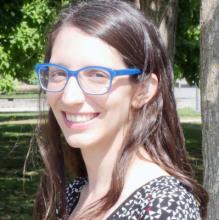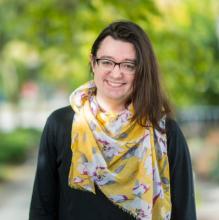My dissertation offers a rhetorical rethinking of Anglo-colonial constructions of health and illness in Canada and the United States to demonstrate how otherness (based on race, gender, sexual orientation, class, age, and physical ability) is pathologized in contradistinction to a presumed norm of cis-heteropatriarchal white health. My work unsettles these norms in order to address implicit biases and structural inequalities that continue to disadvantage marginalized populations.
Research Description
My dissertation offers a rhetorical rethinking of Anglo-colonial constructions of health and illness in Canada and the United States to demonstrate how otherness (based on race, gender, sexual orientation, class, age, and physical ability) is pathologized in contradistinction to a presumed norm of cis-heteropatriarchal white health. Since eugenic ideals of whiteness have been historically aligned with health and citizenship in Canada and the U.S., these norms have informed the medical standards that impact how physicians treat their patients. My work unsettles these norms in order to address implicit biases and structural inequalities that continue to disadvantage marginalized populations.
What does being a Public Scholar mean to you?
Being a Public Scholar is affirmation that the work I do beyond my dissertation is equally valued. Universities are often still perceived to be Ivory Towers in which researchers live, think, and write in isolation. This isn’t the case. Some of my most creative and inspired work has been born out of conversations and collaborations beyond the university, which come to life in unusual places like the B.C. Children’s Hospital, or a Zoom portrait sitting. Being a Public Scholar means that I have the institutional support to pursue initiatives that go beyond UBC, which impact and are accessible to much larger publics.
In what ways do you think the PhD experience can be re-imagined with the Public Scholars Initiative?
The Public Scholars Initiative provides graduate students with a ready-made community of like-minded thinkers doing entirely different things. Meeting smart, passionate people across disciplines is the perfect way to find colleagues and collaborators with new perspectives and methodologies, who can help each other produce innovative research and spur community engagement. The PSI reimagines the PhD experience by expanding scholars’ networks at UBC and optimizing access to the wealth of intellectual resources we have in our larger community.
How do you envision connecting your PhD work with broader career possibilities?
My research investigates racialized and gendered health disparities in North American society. Now more than ever, we need to understand how discrimination is embedded in our institutions, and specifically, how it impacts marginalized peoples’ access to healthcare. Beyond the possibility of working as a university professor and researcher, I believe that my PhD will prepare me for careers in health care policy, medical pedagogy, and more generally, a career focused on social justice and education.
How does your research engage with the larger community and social partners?
Part of my dissertation queries the politics of patient representation in Standardized Patient Programs (SPPs). SPPs enlist actors to roleplay the symptoms of various diseases and disorders, and to embody a range of personalities—some of which are explicitly “difficult.” This simulation is used to help improve the communicative practices of future healthcare workers, such as physicians, physiotherapists, pharmacists, and nurses. My focus is on the use of these programs for medical students and doctors. What can be learned from these fictionalized patient narratives? What changes can be made to improve patient representation? And how might these changes impact real patients’ encounters with future medical doctors? My work on the SPP aims to impact medical pedagogy and practice in order to better serve marginalized populations. Beyond my dissertation, I am a contributing writer for the Health Humanities journal Synapsis, based out of Columbia University. At Synapsis, we address pressing questions in health and medicine with rigorous scholarship that is accessible to non-academic audiences. Translating knowledge and making research accessible beyond the university is crucial to engaging with larger publics.
Why did you decide to pursue a graduate degree?
I decided to pursue a PhD because I was tired of cornering my friends at parties to discuss ideas that were better suited to graduate school. Graduate school has afforded me the time, resources, and community to pursue the critical questions that have always troubled me, and to work with faculty and peers who help me develop my ideas in tangible and impactful ways.
Why did you choose to come to British Columbia and study at UBC?
I decided to study at UBC because I was drawn to the high quality of education and supervision, as well as the more personable feel of my department—the Department of English Language and Literatures. I was also attracted to the interdisciplinary ethos of the university, and in particular, the opportunity to pursue a degree in English Literature and Science and Technology Studies (STS). While English and STS may appear somewhat disconnected, my research has benefited enormously from these complementary disciplines. As for location, I loved the idea of being able to bike year-round and study on Wreck Beach!
Being a Public Scholar means that I have the institutional support to pursue initiatives that go beyond UBC, which impact and are accessible to much larger publics.




